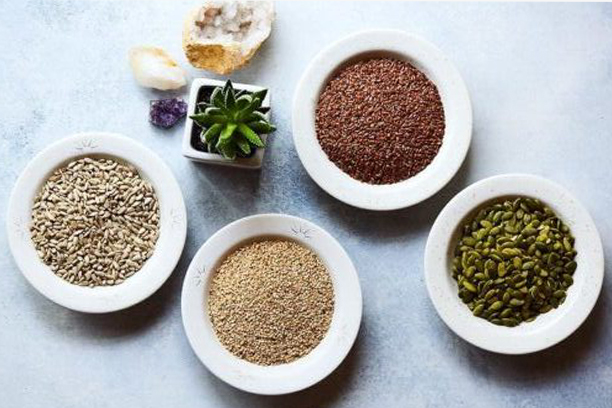As a dietitian, I often work with women who are struggling with hormonal imbalances. These imbalances can manifest as irregular periods, PMS, acne, and fertility issues, among other things. While there are various medical treatments available for these conditions, many women are also turning to natural solutions such as seed cycling.
Seed cycling is an ancient practice that involves consuming specific seeds during different phases of the menstrual cycle to promote hormonal balance. The two sets of seeds used in seed cycling are flax seeds and pumpkin seeds for the first half of the cycle (the follicular phase), and sesame seeds and sunflower seeds for the second half of the cycle (the luteal phase).
Flax seeds are rich in lignans and omega-3 fatty acids, which help reduce estrogen dominance, inflammation and support ovulation. Pumpkin seeds are high in zinc, which aids in progesterone production and supports healthy sperm production.

Sesame seeds are a good source of lignans, which help balance estrogen levels, and contain selenium which supports thyroid function. Sunflower seeds are high in vitamin E, which supports healthy hormonal balance, and also have anti-inflammatory properties.
Seed cycling is an easy and natural way to support hormonal balance, especially for women struggling with hormonal imbalances. Simply sprinkle the recommended seeds on top of your meals or blend them into smoothies.
However, it’s important to note that seed cycling is not a substitute for medical treatment or a balanced diet. While seed cycling can be a helpful tool, it’s important to address any underlying health issues that may be contributing to hormonal imbalances.
Seed cycling can be particularly helpful for women who are trying to conceive. It’s been shown to support ovulation, balance hormone levels, and promote a healthy uterine lining.
If you’re interested in trying seed cycling, it’s important to be consistent and patient. It can take a few cycles to see results, but many women have reported positive outcomes after incorporating seed cycling into their routine.
In conclusion, seed cycling is a simple and natural way to support hormonal health. Incorporating these nutrient-rich seeds into your diet can have positive impacts on fertility, menstrual cycle regulation, and overall well-being. While seed cycling is not a cure-all, it can be a helpful tool in conjunction with medical treatment and a balanced diet. If you’re struggling with hormonal imbalances, talk to a registered dietitian or healthcare provider to determine if seed cycling is right for you.
